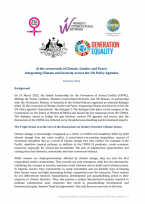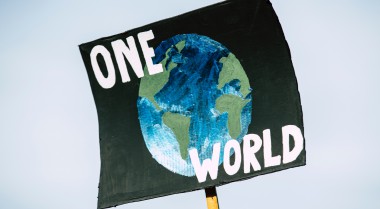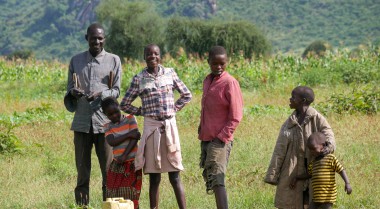
At the crossroads of Climate, Gender and Peace: Integrating Climate and Security across the UN Policy Agendas
Climate change is increasingly recognised as a driver of conflict and instability. While by itself climate change does not cause conflict, it exacerbates pre-existing inequalities, and sources of communal instability that as a result of climate change turn into conflict. For example, in the Pacific, repetitive tropical cyclones, in addition to the COVID-19 pandemic, create economic insecurity, especially for women-led households. The lack of employment opportunities and raising prices fuel domestic, community and inter-communal violence.
While women are disproportionately affected by climate change, they are also the first respondents within communities. They provide not only emergency relief but also advocate for redefining the concept of security, maintaining social cohesion and re-build social infrastructures. Without women first respondents, national governments often see climate change as another humanitarian disaster that requires humanitarian support. They often miss to understand how exactly climate change drives conflict and, therefore, develop responses based on macro-level data. However, women can change their perspectives and improve response, if and when they are meaningfully included in the decision-making on humanitarian, peacebuilding and development priorities.
On 24 March 2022, the Global Partnership for the Prevention of Armed Conflict (GPPAC), Shifting the Power Coalition, Women's Intercultural Network, and UN Women, in partnership with the Permanent Mission of Australia to the United Nations organised an informal dialogue titled “At the crossroads of Climate, Gender and Peace: Integrating Climate and Security across the UN Policy Agendas” to explore this further.
The work of women activists working at the community level demonstrates that there is no space for divisions between various agendas, and peacebuilding, development and humanitarian experts need to be part of all conversations that shape the future of the people. As such, they can diversify and strengthen their perspective. Diverse partners should not work in silos, but rather work together to address climate change.
The Agreed Conclusions of the CSW66 and the discussions surrounding the forum present an opportunity for peacebuilding and development experts to adapt a variety of priorities for their own action. These include:
- Developing sustained gender- and climate-sensitive financing strategies
- Supporting the localisation of the global climate and security agenda
- Supporting feminist peacebuilding networks and coalitions


